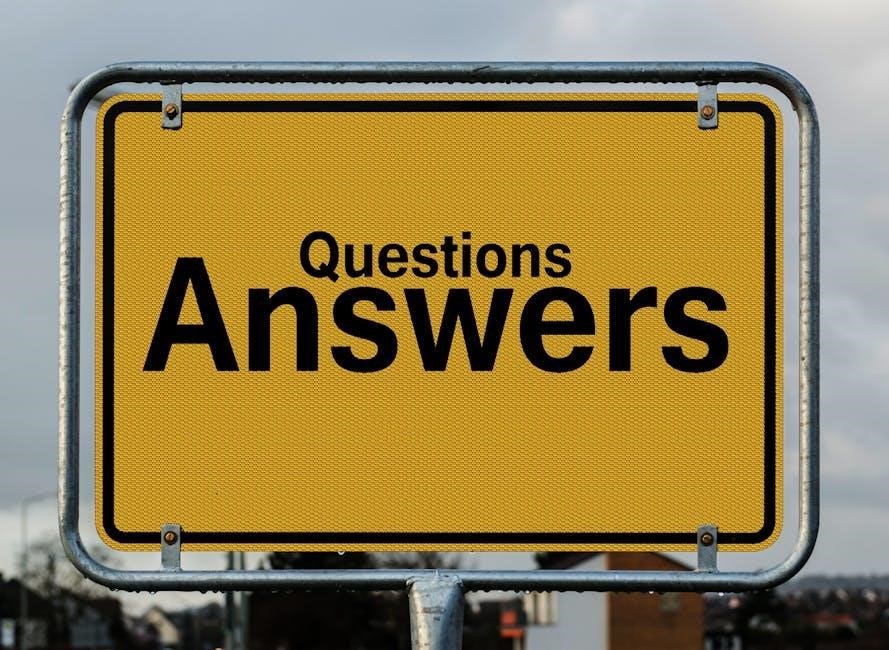The Paralegal Interview Questions and Answers PDF offers 50 critical questions designed to test and expand your expertise. Perfect for all experience levels, this guide ensures thorough preparation.
Overview of the Importance of Preparation
Preparation is key to excelling in paralegal interviews. Researching common questions, practicing answers, and understanding the firm’s needs ensures confidence. Many interviews include tasks like legal research or organizing data, requiring sharp analytical skills. Using the STAR method to structure responses helps showcase problem-solving abilities. Understanding the firm’s practice areas and client base demonstrates initiative. Highlighting skills like organization, attention to detail, and communication is crucial. Preparation not only addresses weaknesses but also aligns your strengths with the firm’s expectations, making you a standout candidate.
Structure and Content of the PDF Guide
The PDF guide is organized into sections covering essential topics such as general questions, behavioral assessments, legal knowledge, situational scenarios, and interview strategies. It includes 50 critical questions tailored for all experience levels, ensuring comprehensive preparation. Each section provides sample answers and tips, focusing on key skills like analytical thinking and communication. The guide also offers insights into legal ethics and professionalism, ensuring candidates understand their role in upholding confidentiality. With practical advice and real-world examples, this resource helps paralegals present themselves effectively, aligning their expertise with the firm’s needs.
Most Common Paralegal Interview Questions
Common questions focus on background, problem-solving, legal knowledge, and situational scenarios, helping assess skills, experience, and fit for the role.
General Questions About Background and Motivation
General questions explore your career choice, inspiration for becoming a paralegal, and reasons for applying to the firm. Examples include, “What made you decide to become a paralegal?” or “Why do you want to work here?” These questions help employers understand your passion, alignment with the firm’s values, and long-term goals. Be prepared to discuss your educational background, relevant experiences, and what drives your interest in the legal field. Highlight your motivation to contribute to the firm’s success and how your skills align with their needs.
Behavioral Questions to Assess Problem-Solving Skills
Behavioral questions evaluate how you handle real-life scenarios, focusing on problem-solving and critical thinking. Examples include, “Tell me about a time you had to manage multiple deadlines,” or “How do you handle legal research under tight time constraints?” These questions require you to demonstrate your ability to analyze situations, make sound decisions, and deliver results. Use the STAR method (Situation, Task, Action, Result) to structure your responses clearly. Highlight your organizational, analytical, and decision-making skills, showing how you effectively navigate challenges in fast-paced legal environments.
Legal Knowledge and Research Skills Questions
Legal knowledge and research skills are critical for paralegals. Questions may include, “Can you locate a specific statute related to our practice area?” or “How do you ensure the accuracy of your legal research?” These assess your ability to apply legal concepts and conduct thorough research. Be prepared to discuss your methods for verifying sources, organizing findings, and presenting clear, concise results. Highlight your attention to detail and ability to interpret legal information effectively, demonstrating how you contribute to legal proceedings and case preparation.
Situational Questions for Paralegal Roles
Situational questions assess how you handle real-life legal scenarios. Examples include, “How would you manage multiple deadlines in a fast-paced environment?” or “Describe a time you handled sensitive client information.” These questions evaluate your problem-solving, organizational, and ethical decision-making skills. Be prepared to provide specific examples from your experience, demonstrating your ability to prioritize tasks, maintain confidentiality, and work effectively under pressure. Use the STAR method to structure your responses, ensuring clarity and relevance to the role.

How to Ace Your Paralegal Interview
Thoroughly research the firm, practice common questions, and use the STAR method for behavioral responses. Showcase your analytical, organizational, and communication skills to stand out.
Tips for Preparing for Common Questions
Research the law firm thoroughly to tailor your answers. Practice responding to common questions using the STAR method for behavioral queries. Review key skills like analytical abilities, attention to detail, and communication. Anticipate questions about handling sensitive information and demonstrate problem-solving skills. Prepare examples showcasing your organizational and time management abilities. Familiarize yourself with legal terminology and practice explaining complex concepts clearly. Consider potential questions about flexibility and willingness to work beyond standard hours. Finally, review your resume and be ready to discuss your experiences and how they align with the role.
Using the STAR Method to Answer Behavioral Questions
The STAR (Situation, Task, Action, Result) method is a powerful framework for answering behavioral questions in paralegal interviews. Start by describing the Situation—the context of your story. Next, outline the Task you were responsible for. Then, detail the Actions you took to address the challenge. Finally, conclude with the Result, emphasizing the positive outcome. This structured approach ensures clarity and impact, allowing you to showcase your problem-solving skills, organization, and ability to manage deadlines effectively. By practicing this method, you can deliver confident, concise responses that highlight your expertise and readiness for the role.
Researching the Law Firm Before the Interview
Researching the law firm before your interview demonstrates initiative and genuine interest. Start by understanding their practice areas, client base, and recent cases. Familiarize yourself with their company culture and values to align your answers with their expectations. Learn about the attorneys and key team members to show preparedness. This knowledge enables you to tailor your responses, highlighting how your skills and experiences match their needs. Additionally, understanding their specific challenges can help you present solutions, showcasing your problem-solving abilities. Thorough research not only impresses interviewers but also helps you make informed decisions about the role.

Key Skills to Highlight in Your Answers
Highlight analytical, organizational, and communication skills, along with attention to detail and flexibility. Demonstrate time management abilities and the capacity to handle sensitive information confidentially.
Emphasizing Analytical and Organizational Skills
Analytical and organizational skills are essential for paralegals, as they often handle complex legal research and document preparation; Highlighting your ability to manage multiple tasks, prioritize deadlines, and maintain accuracy under pressure is crucial. Provide examples of times you successfully organized large volumes of data or streamlined processes to improve efficiency. Demonstrating how your skills align with the firm’s needs will showcase your value as a detail-oriented and proactive professional. This emphasis will help you stand out as a capable and reliable candidate in a fast-paced legal environment.
Importance of Communication and Attention to Detail
Effective communication and attention to detail are paramount for paralegals, as they ensure clarity and accuracy in legal documentation and client interactions. Showcase your ability to articulate complex ideas clearly and listen actively. Highlight instances where your attention to detail prevented errors or improved outcomes. Strong communication fosters collaboration with attorneys, clients, and teams, while precision maintains professionalism and trust. Demonstrating these skills through specific examples will underscore your reliability and commitment to excellence in a demanding legal environment.
Demonstrating Flexibility and Time Management Abilities
Highlighting your flexibility and time management skills is crucial, as paralegals often work in fast-paced environments with multiple deadlines. Emphasize your ability to adapt to changing priorities and handle evening or weekend tasks when needed. Provide examples of managing competing demands, such as balancing research tasks with document preparation. Showcase organizational tools, like calendars or task lists, to illustrate how you maintain efficiency. Flexibility and strong time management not only meet client needs but also contribute to the smooth operation of legal teams, making you a valuable asset in dynamic settings.

Red Flags to Avoid During the Interview
Avoid appearing unprepared, negative, or unprofessional. Red flags include lack of research about the firm, poor communication, and failure to address weaknesses effectively. Maintain positivity and focus.
Common Mistakes Candidates Make
Many candidates underestimate the importance of researching the firm, arriving unprepared, or lacking knowledge about the role. Others may speak negatively about previous employers or fail to address weaknesses effectively. Appearing disorganized, lacking enthusiasm, or showing poor communication skills can also harm impressions. Additionally, some candidates may not tailor their answers to the firm’s needs or fail to ask insightful questions. Avoiding these mistakes requires thorough preparation, a positive attitude, and clear, concise communication. Demonstrating professionalism and attention to detail is crucial to making a strong impression during the interview.
How to Address Weaknesses Effectively
When addressing weaknesses in a paralegal interview, honesty is key, but frame your response positively. For example, mention a skill you’re actively improving, like time management or delegation, and explain how you’re addressing it. Use the STAR method to structure your answer, focusing on specific situations, tasks, actions, and results. Avoid negative remarks about past employers or exaggerated flaws. Show self-awareness and a willingness to grow, demonstrating how you’ve learned from past challenges. This approach highlights your proactive attitude and commitment to professional development, making you a more attractive candidate.

Post-Interview Follow-Up
After the interview, send a thank-you note to express gratitude and reiterate interest. This demonstrates professionalism and enthusiasm. Stay patient and informed about next steps in the process.
Writing a Thank-You Note
A thank-you note is a professional courtesy that reinforces your gratitude and interest in the position. It should be sent within 24 hours of the interview, expressing appreciation for the opportunity and reiterating your enthusiasm. Personalize the note by referencing specific topics discussed, such as your qualifications or the firm’s values. Keep it concise and sincere, ensuring proper grammar and tone. This gesture not only demonstrates politeness but also highlights your attention to detail and organizational skills, which are essential for a paralegal role. It leaves a positive impression and shows your commitment to the position.
Understanding the Next Steps in the Hiring Process
After the interview, it’s important to understand the next steps in the hiring process. Typically, this includes waiting for feedback, which may take several days or weeks; Some firms may conduct additional interviews or skills assessments. If selected, you’ll receive a job offer outlining salary and benefits. If not, polite follow-up can provide closure or feedback for improvement. Stay proactive by expressing continued interest and inquire about timelines. Understanding these steps helps manage expectations and demonstrates professionalism, showing you value the opportunity and are prepared for the role.

Legal Ethics and Professionalism
Legal ethics and professionalism are crucial for paralegals, emphasizing confidentiality and handling sensitive information. Understanding ethical dilemmas ensures trust and integrity in legal practice. This section explores essential principles and scenarios to maintain high standards.
Questions About Confidentiality and Sensitivity
Confidentiality is a cornerstone of legal practice, and paralegals must handle sensitive information with utmost care. Interviewers often ask how you maintain confidentiality, especially in high-stakes cases. Be prepared to discuss scenarios where you managed sensitive data or documents, ensuring no breaches occurred. Highlight your understanding of ethical obligations and how you avoid unauthorized disclosures. Demonstrating awareness of confidentiality protocols and your commitment to upholding them is essential. This reflects your professionalism and reliability in safeguarding client information and maintaining trust in the legal process.
Understanding the Role of a Paralegal in Legal Ethics
Paralegals play a vital role in upholding legal ethics, ensuring compliance with professional standards. They must avoid conflicts of interest, maintain client confidentiality, and refrain from practicing law. Understanding these ethical boundaries is crucial, as paralegals often handle sensitive tasks like document preparation and research. Ethical dilemmas may arise, requiring sound judgment to resolve them appropriately. Demonstrating a clear grasp of ethical responsibilities and the ability to navigate such challenges is essential for building trust and credibility in the legal team.
Preparation and practice are key to acing your paralegal interview. Use this guide to refine your skills, stay proactive, and confidently showcase your expertise.
Summarizing Key Takeaways
Preparation is essential for paralegal interviews, focusing on common questions about background, problem-solving, and legal knowledge. Emphasize analytical and organizational skills, communication, and attention to detail. Use the STAR method for behavioral questions and research the firm thoroughly. Highlight flexibility, time management, and ethical awareness. Avoid common mistakes like lacking preparation or failing to address weaknesses. Follow up with a thank-you note and stay informed about the hiring process. Continuous practice and tailored responses will enhance your confidence and readiness for success.
Encouragement to Practice and Stay Prepared
Consistent practice and preparation are vital for acing your paralegal interview. Regularly review the PDF guide to familiarize yourself with common questions and tailor your responses. Use the STAR method to structure behavioral answers, highlighting your analytical and organizational skills. Stay updated on legal trends and research the firm thoroughly before your interview. Practice articulating your strengths, such as attention to detail and time management, while addressing weaknesses confidently. By staying proactive and informed, you’ll boost your confidence and readiness, ensuring you make a lasting impression and increase your chances of success in securing your desired role.